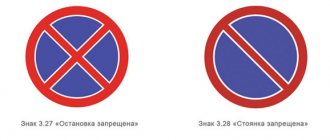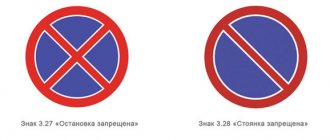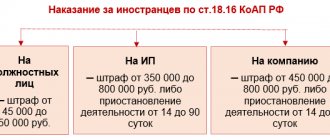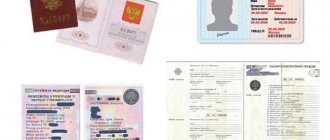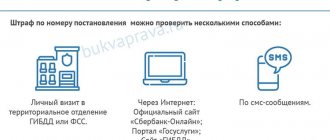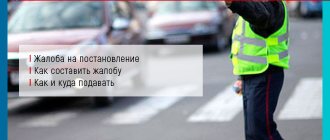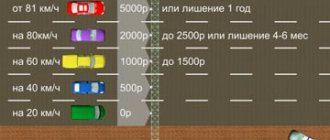How do you know if you have fines? How and where to pay a fine with a 50% discount? What is the statute of limitations for fines? How to challenge traffic fines? These and other similar questions often concern motorists. In this article you will find the answers.
Any driver sooner or later commits a violation of traffic rules, which is recorded automatically by a traffic police officer or traffic cameras. And even if the violation was not committed intentionally, the law requires the execution of the fine.
From the article you will learn:
- Fines from cameras and fines from an inspector: what's the difference?
- What fines are recorded by cameras?
- Where and according to what rules are cameras installed to record violations?
- What to do if you have been fined
- How to appeal a fine
- Traffic fine payment deadline
- Statute of limitations for traffic police fines
- Where to check fines and how to pay them
- How to pay a fine with a 50% discount
- How to control fines for legal entities
Fines from cameras and fines from an inspector: what's the difference?
Fines for violations recorded personally by the inspector and for violations caught on camera differ in the way they are issued.
The inspector draws up a protocol and/or resolution directly against the violator. When registering, the details of his passport or driver’s license number are recorded.
The fine recorded by the camera is issued to the owner of the car, so in the database it is linked to the number of the car’s registration certificate.
Therefore, if you lent a car to a friend, and he violated traffic rules on camera, a fine will come to you as the owner of the car.
It is important to know this, because when checking fines, for example, on the traffic police website.rf in the search results you will see:
- fines from cameras or from an inspector, issued specifically to you and for your violations;
- fines from the camera against you, as the owner of the car, although the violator could, for example, be your son or wife;
- fines from an inspector against another person to whom you lent your car.
If you don’t figure it out right away, you may end up paying more than just your fines. Some popular services, for example, a mobile application, help differentiate fines and avoid paying them for someone else.
Here you can find the complete and current table of traffic police fines 2021.
How long are fines stored in the traffic police database?
Information about all unpaid fines goes into the traffic police database. Therefore, if a driver who has violated the rules but has not paid the required amount continues to use the car, he faces being stopped at any traffic police post to monitor the execution of the court order.
Data in the traffic police database is stored until the imposed sanctions are paid. Even after the expiration of the two-year limitation period established by law for fines for traffic violations, the information will remain in the register, despite the absence of the need to repay the debt.
What fines are recorded by cameras?
Drivers have long been accustomed to the fact that cameras can record speeding, crossing a continuous road and driving into oncoming traffic. However, modern video recording tools are already able to recognize other violations on the roads:
- Driving on the side of the road. For such a violation, the driver will receive a fine of 1,500 rubles. In this case, the camera cannot be fooled by the emergency lights being on. Parking cameras have already come to the aid of stationary cameras in this matter, although so far only on the Moscow Ring Road.
- Driving through the parking lot. As with driving on the side of the road, some drivers use the space of parking spaces to avoid traffic jams. In Moscow, along with the fine, violators receive a storyboard from a camera, which proves that the car was moving in the parking lot, and not parked there.
- Driving in the public transport lane. In the regions, the fine for a “bus lane” is 1,500 rubles, in Moscow and St. Petersburg - 3,000 rubles.
- Entering a busy intersection. If there is a waffle marking at such an intersection, most likely it is being filmed by a camera. It will detect a car that entered the waffle at a prohibitory traffic light and stayed there for more than 5 seconds.
- Violations at pedestrian crossings. Cameras on zebra crossings have learned to record and analyze several factors: how much time the pedestrian spent at the crossing, how fast he was moving along the zebra crossing, how fast the car was moving, whether he slowed down in front of the zebra crossing, whether the trajectories of the pedestrian and the car intersected.
- Violations at railway crossings. Here, cameras also record different types of violations: passing the tracks when the barrier is closing or closed, driving through a red light and stopping on the tracks.
- Driving through a red traffic light. This will result in a fine of 1,000 rubles, and for each repeated similar violation - 5,000 rubles. If a car crosses the red stop line but stops, the driver will get off with a fine of 800 rubles. At the same time, as is clear from the previous paragraph, reverse gear will not save you.
- Parking in a prohibited place. Cameras monitor violations of the requirements of the “No Stopping” and “No Parking” signs. Cameras are also installed in front of public transport stops.
- Unpaid parking. In Moscow, this is recorded by stationary “Street Falcons” and parking lots. Fines differ in different regions, but almost everywhere they are impressive. For example, in the capital - 5,000 rubles, in St. Petersburg - 3,000 rubles.
- Unfastened seat belt and talking on the phone while driving. Several traffic cameras in Moscow have learned to notice such violations. Photos of drivers whom the neural network suspects of violating are still checked manually by data center employees, and only then are they sent or not sent to the traffic police.
- Lack of MTPL policy and technical inspection. Cameras can already detect cars whose drivers have not taken out a compulsory motor liability insurance policy. However, inaccuracies in the combined database of insurers and the traffic police are still preventing this from being put into production. The issuance of fines for the absence of a diagnostic card using cameras will presumably begin in 2022. It is planned that the cameras will record the violation once a day until the driver passes the technical inspection.
- Violation of the self-isolation regime. It was planned that by the end of 2020, mobile cameras in Moscow would be trained to identify cars whose owners must comply with quarantine. But since the cameras are still focused on the car data, and not on the driver’s identity, many errors are possible.
How to find out if the fine has expired
You can check whether you have an unpaid fine without leaving your home - through services on the Internet. All information about imposed penalties goes to the GIS GMP - the state register of municipal payments. The same register stores data on fines for illegal parking and other violations.
Based on the data from this resource, information is published in the traffic police database, on dozens of websites on the Internet, and on State Services.
To search, you must enter the details (number and series) of the following documentation:
- driver's license of the offender;
- vehicle registration certificate.
It is impossible to obtain information about fines by car number; for this you will need the information from the listed documentation.
Site Expert
Fasakhovva Elena Alexandrovna
Member of the Russian State Duma Committee on Non-Bank Credit Institutions. Has been involved in bankruptcy proceedings since 2015.
Ask a Question
Another way to establish the circumstances of the collection of penalties is to clarify the presence of the case in the enforcement proceedings of the FSSP, published in the register on the website of this department. To obtain information, you need to know the number and date of the relevant decision of the judicial authority.
Where and according to what rules are cameras installed to record violations?
Cameras operating on Russian roads must comply with GOSTs R 57144-2016 and R 57145-2016. They establish requirements for the design features of cameras, their operation and installation locations. According to GOSTs, cameras are installed:
- on sections of roads with limited visibility;
- at railway crossings;
- at intersections of roads with pedestrian and bicycle paths;
- at signalized intersections;
- near educational institutions and crowded places;
- in places where parking or stopping of transport is prohibited;
- on sections of roads with automated weight and size control;
- on roads with a dedicated lane for public transport;
- when changing the speed limit on a section of the road;
- at intersections, roads in the city and outside the city, where more than three accidents with injuries occurred during the year;
- on sections of roads where there are frequent cases of vehicles passing on the side of the road, sidewalk or dividing strip.
A stationary camera can stand alone on an individual stand, or can be mounted on a lamp post, traffic light, road sign or sign, on bridges, overpasses and tunnels. Mobile cameras are installed on roadsides and medians.
If there is a decrease in the number of violations in the place where the camera previously stood, it may be replaced with a dummy one.
Usually, if there is a camera on a section of the road, it is indicated with a sign “Photo and video recording.” But neither the traffic rules nor the GOSTs yet have a mandatory requirement for the installation of such a sign.
The “Photo and video recording” sign refers to signs of additional information, that is, it clarifies the effect of other signs. Accordingly, this sign is not installed separately. According to GOST R 52289-2004, it is placed on traffic lights and road signs 1.1, 1.2, 1.8, 1.22, 3.1-3.7, 3.18.1, 3.18.2, 3.19, 3.20, 3.22, 3.24, 3.27-3.30, 5.14, 5.21, 5.27 and 5.31.
In 2021, the Ministry of Internal Affairs developed changes to the traffic rules, which should introduce a new sign 6.22 “Photo and video recording.” The text of the draft states that the sign will not necessarily be tied to others. It is expected that it will be placed 150–300 meters before the beginning of the control zone and together with signs “Beginning of a populated area.” The document is currently under review. What the new “Photo and Video Recording” sign will look like has also not been determined.
Lawyer for writing off a fine under the Code of Administrative Offenses of the Russian Federation in Yekaterinburg
Fines under the Code of Administrative Offenses are imposed within a short period of time. Such short deadlines are also provided for appealing, reducing and writing off a fine. The choice of most citizens and organizations who do not want to miss valuable time is to contact an experienced lawyer to write off a fine.
The law office “Katsailidi and Partners” successfully provides assistance in writing off fines to a huge number of clients. To receive qualified assistance with a fine, we invite you to our office - Yekaterinburg, Otdelny Lane, building 5.
What to do if you have been fined
First, look at the time and place of the violation indicated in the resolution, as well as the photo. Even if you may have been driving on the same road at the time, the photos from the cameras may show a completely different car. The fact is that sometimes cameras do not recognize the license plate correctly.
Also check whether the period for administrative liability has expired. If more than 2 months have passed from the moment of the violation until the decision was made, the fine is already considered invalid and must be appealed. This is discussed in Article 4.5. Code of Administrative Offenses of the Russian Federation.
If the photographs accompanying the decision are still your car, the fine may still be issued unreasonably. It happens that the camera does not capture your car, but a neighboring or some other object. For example, in Moscow, a driver received a decree because the shadow of his car crossed a solid marking line.
And in Tatarstan, the owner of a car that was being transported on a tow truck received a fine for exceeding the permissible speed limit.
In order not to pay a fine for someone else and for camera errors, you need to appeal it in time.
Is it possible to get your license back if it was deprived along with a fine that was burned?
If the driver has committed a serious offense, the traffic police inspector may not limit himself to a monetary penalty. Current legislation provides for the possibility of deprivation of rights for up to a year as an additional measure.
Thus, if 2 years have passed since the entry into force of the resolution, the driver is exempt from payment. However, in this case it will not be possible to return the rights. The fact is that the need to deposit funds is a prerequisite for the return of the driver's license. Therefore, if the driver wants to drive in the future, he will have to pay a fine.
How to appeal a fine
If you are sure that you did not violate the law and the decision was sent to you erroneously, appeal it. A complaint against a decision must be sent to the district (city) court or the official who issued the decision on the case. You can appeal the decision no later than 10 days from the date of receipt of its copy. A sample complaint against a traffic police resolution looks like this:
It is not yet possible to challenge a fine via the Internet in all regions and not for every violation.
Fines from the Moscow Parking Space Administrator (AMPP) can be appealed on the Autocode portal, on the mos.ru website and through a special form on the Moscow Transport website. Fines from MADI are disputed here and through the electronic reception of the Moscow Government.
Russian Post has. It allows you to send a registered letter, including an application to appeal a fine, to the desired department directly from the application or from the Russian Post website. But there is a caveat: if the department is not able to receive letters electronically, they will be printed and delivered in the usual way. So it’s unlikely to work out faster.
Drivers may soon have the opportunity to appeal a fine through State Services. A bill on relevant changes to the Code of Administrative Offenses of the Russian Federation is already under consideration in the Federation Council.
But for now, most Russian drivers are challenging fines the old-fashioned way: by personally submitting a written statement to the agency that issued the fine. For more information about what a statement of complaint should contain, where to send it, what arguments to use, read the article “How to appeal fines from the State Traffic Safety Inspectorate, MADI, AMPP, sample complaints, analysis of situations.”
But there is a problem with the deprivation of rights being 2 years old!
The point here is that one of the conditions for returning the right to drive after deprivation is payment of all existing traffic police fines (Article 32.6 of the Code of Administrative Offenses) ... Including those imposed along with the deprivation of 30,000 rubles.
And, if 2 years have passed since the sanction was overdue, then here lies a conflict of law:
- on the one hand, the period of compulsory execution has expired - the fine must be canceled after 2 years, and there is no obligation to pay it,
- on the other hand, traffic police officers will not give you the right, since the condition for paying fines in Article 32.6 does not overlap with the specified 2 years.
But there is one big “but”! Both provisions of the law do not actually contradict each other, but complement each other. The condition of paying the fine does not go away to return the driver's license. But the existing fine is essentially not payable after 2 years, so there is no obligation to pay it.
What to do?
If the traffic police insist on paying a fine that was canceled due to the statute of limitations, then you should go to the bailiff who is handling your case with this sanction and take a confirming document (certificate) stating that the enforcement proceedings were terminated on the basis of Article 31.9 of the Code of Administrative Offenses upon expiration limitation period for execution.
Next, with this document, you should submit a petition to the traffic police officer who issued the fine, or to his boss, if he has already been dismissed, for a ruling to terminate the penalty on the basis of limitation under Article 31.9 of the Code. But such definitions may not be given, and they will be sent to the bailiffs, and they will be sent back to the traffic police. If you submit a petition on video recording, then in the future in court you will have evidence of this.
That is why in the subtitle we identified this as a problem, since in this case the refusal will have to be appealed in court. To do this, you need to submit a written application to the traffic police for the return of rights after deprivation with this certificate from the bailiffs, to which the inspector who accepted it is obliged to give a written refusal (you cannot appeal a verbal one). And with a written response, a statement of claim is filed at the location of the department to which you applied.
Traffic fine payment deadline
If you agree with the decision and do not intend to appeal it, then you need to pay for it.
According to the Code of Administrative Offenses of the Russian Federation, the fine must be paid in full no later than 60 days from the date the resolution enters into legal force.
To this period add 10 days allotted for appeal.
If the fine is not paid after the expiration of this period, the materials from the traffic police are sent to the Federal Bailiff Service (FSSP). At the same time, the materials of the administrative case are sent to the court under Article 20.25 of the Code of Administrative Offenses of the Russian Federation “Evasion from execution of administrative punishment”, which provides for a fine of twice the amount of the unpaid fine (but not less than 1000 rubles), or arrest for 15 days, or compulsory labor for up to 50 hours.
After receiving materials from the traffic police, bailiffs initiate enforcement proceedings and give the debtor 5 days to voluntarily repay the debt. If the debt is not paid voluntarily, the amount of the fine is forcibly written off from bank cards, withheld from wages, etc. An enforcement fee in the amount of 7% of the debt amount is added to the existing debt, but not less than 1000 rubles.
Read more in the article “Consequences of non-payment of fines”.
What is the penalty for non-payment?
The current version of the Code of Administrative Offenses of the Russian Federation in Art. 20.25 provides for the application of the following measures in relation to undisciplined drivers who do not want to voluntarily pay funds for imposed administrative penalties:
- adding to the previously established amount a new fine in double the amount, with a change in the countdown of the period from the moment the new decision of the judicial authority enters into force; for example, if the violator had to pay 1,000 rubles, additional penalties will amount to 2,000 rubles, with a total payment of 3,000 rubles;
- administrative arrest for a period of up to 15 days - cannot be applied to women bearing a child, caring for young children, or in the presence of serious illnesses; in this case, another measure provided for by law is taken;
- corrective labor for up to 50 hours; If the violator refuses to carry out this punishment, this may result in criminal prosecution.
An arrest is impossible if the violation is recorded automatically by a traffic video camera.
Also, do not forget about the additional measures taken by bailiffs to ensure the execution of a court decision. The violator may be prohibited from traveling abroad, property confiscated for forced debt collection, or money transferred from his bank account or salary.
Where to check fines and how to pay them
In accordance with the requirements of the legislation of the Russian Federation, information about all new fines from the traffic police must be sent to the state information system on state and municipal payments - GIS GMP. To check your fines, use any service connected to the GIS GMP. Let's list the most popular ones.
Public services
Only registered users who have filled out information about their driver’s license and car registration certificate in their personal account can check and pay car fines on State Services. Under the same conditions, you can pay fines in the State Services mobile application.
Bank websites and applications
Every bank today offers the opportunity to pay for any services directly from your phone, including fines from the traffic police and other departments. To check whether you have any car fines, it is usually enough to indicate one thing: driver’s license number, vehicle registration certificate or decree number.
Moscow Government website
On the mos.ru website, residents of all regions, not just Moscow, can check and pay fines from the State Traffic Safety Inspectorate, AMPP and MADI. Using your driver's license number, STS number or resolution number, you can see all your fines: paid and unpaid.
Website onlinegibdd.ru
This service is connected to several sources of information, including the GIS GMP, and collects not only traffic police fines, but also fines from MADI and Moscow parking.
To check for unpaid fines, please provide your driver's license or vehicle registration number. Information about payment is sent to the Federal Treasury at the same time the payment is made, so neither you nor the traffic police will have any questions about the timely repayment of the fine. The money ends up in the traffic police accounts within 1-3 business days, and over the next 2 days the fine is usually removed from the traffic police database.
Check car fines
What is the statute of limitations for fines?
The legislation of the Russian Federation provides for the possibility of releasing the offender from punishment after a certain period of time. This also applies to traffic police fines.
In general cases, the duration of the specified time period is three years. But the period of the traffic police fine, in accordance with the provisions of Art. 31.9 of the Code of Administrative Offenses of the Russian Federation, remains for two years.
This period is calculated from the date on which the decision of the judicial authority, formalized by the relevant resolution, comes into force, since for another ten days after signing the violator has the right to challenge the measures taken against him.
Similar conditions are typical for penalties imposed as a result of video recording of an offense. Such punishment also expires two years from the date of entry into force of the court decision.
A two-year period for collection of the required amount remains in respect of any penalties imposed for traffic violations. The same is the statute of limitations for deprivation of rights, speeding and other illegal actions on the road, including those that caused an accident. The situation with causing harm to health is somewhat different, including if the case is being considered as part of criminal proceedings. The statute of limitations for such violations is unlimited.
How to pay a fine with a 50% discount
Part 1.3 of Article 32.2 of the Code of Administrative Offenses of the Russian Federation allows drivers to pay only half of the administrative fine. But such a discount is valid only for 20 days from the date of the decision and not for all types of violations. For example, the discount does not apply to some repeated and serious traffic violations, such as drunk driving or running a red traffic light. The full list of exceptions and the features of providing a discount are described in the article “Traffic police fines with a 50% discount, we share our experience.”
However, in some circumstances, the discount on the fine can be restored even after 20 days from the date of the decision. This is possible if a paper copy of the decision reaches the addressee after the expiration of the twenty-day period. In this case, the driver must file a complaint with the court or the official who issued the decision. Read more about the procedure for restoring a discount on a fine in our article.
Reduction of administrative fine
Reducing the fine is a possibility provided for by the Administrative Code itself. However, there are not many circumstances indicating the possibility of reducing the fine.
An experienced lawyer will be able to take a number of measures to reduce the amount of punishment, namely:
Familiarize yourself with the case materials and find circumstances indicating the possibility of reducing the fine
File a complaint regarding the case
Participate in the revision process.
A number of the above manipulations require a highly qualified lawyer and his experience, knowledge of judicial practice.
USEFUL : for more information about reducing the fine under the Administrative Code of the Russian Federation, follow the link on the website
How to control fines for legal entities
Legal entities that own a fleet of vehicles often encounter difficulties in tracking and paying fines. It happens that decisions do not arrive on time or are lost altogether. Often it is not possible to pay a fine at a discount or appeal it on time. And the more cars in the fleet, the more problems.
It is better not to wait for the decision to arrive by mail, but to periodically check possible fines online yourself. Some popular services like the traffic police website and State Services have drawbacks. For example, State Services do not show photographs of violations, and on GIBDD.rf you cannot find fines according to the organization’s TIN and fines from MADI and AMPP. Both services do not have tools for paying fines by non-cash method; it is impossible to control the repayment of fines and track the history of fines.
In order not to waste a lot of time tracking and paying the organization’s car fines, many large corporate fleets, carriers and leasing companies use the Online State Traffic Safety Inspectorate super service. Users of the super service only need to fill out information about all the cars in the fleet once, so that in the future they do not have to manually check fines for each of them, pay for them online in a convenient way and control their repayment. The service can be integrated with the organization’s accounting system, and you can also set up automatic notifications of new fines via SMS or email.
Read more about the features of different services for legal entities for monitoring car fines in our article “Staff traffic police fines for legal entities - how to start monitoring all decisions.”
Checking fines for legal entities. persons
Do you want to monitor fines, receive a daily report on new fines found and pay them?
Try for free
Don't miss new useful publications
We will tell you about the intricacies of the legislation, help you understand it and tell you what to do in controversial situations.
What are the alternatives to waiting for unpaid fines to expire?
In fact, there are much better options than waiting for the fine to expire and not paying it. There are two such options.
The first of these is that if the fine is recent and if it is not one of the exceptions, then it can be paid with a 50% discount. Exceptions include fines for intoxication, leaving the scene of an accident, and a number of others; you can read the full list of exceptions in our separate article. Why is this a great alternative? Yes, because this is a legal way to pay a fine at half the price than waiting for the fine to expire, which is most likely futile, because the communication between the traffic police and bailiffs for 2021 works perfectly in most regions of Russia, and overdue fines are very quickly transferred to FSSP service.
The second option not to pay the fine is to appeal it. If there are reasons, of course. But even if they are very unpromising, you can always hope for procedural violations and oversights. The fact is that the process of reviewing cases is quite complex, and the duration can be very long. And the deadlines, as you noted, in the Code of Administrative Offenses in some cases are not very extensive. Thus, the statute of limitations for prosecution is 2 or 3 months in certain cases. And this period is not interrupted by an appeal. And, if, for example, you wait months for the appeal trial, then it is likely that the fine will be canceled due to the deadline.
Collection procedure
The process of collecting traffic fines can be divided into two stages. At the first of them, the bailiffs pass the order. The document records information about the violation and the amount of the penalty. Typically, the document reaches the bailiff service within 10 days from the date of its execution.
If the debtor does not comply with the requirements imposed on him by the court, the second stage begins. Representatives of the FSSP collect the debt forcibly. To do this, the property that belongs to the non-payer of the fine is seized and subsequently sold.
Application for appeal
The outcome of solving the problem largely depends on the quality of the application drawn up to appeal the illegal collection of a traffic police fine by bailiffs. Therefore, its preparation must be approached responsibly. The application should include the following information:
- The name and address of the institution to which the citizen applies. The information should be reflected in the application header. Below is information about the debtor and the applicant. Next, you need to provide information about the relatively interested person - the bailiff who executed the traffic police resolution.
- Title of the paper. It can be called a complaint or a statement about illegal actions or inaction of a bailiff. Experts advise using the second option.
- Fill out the body of the document. In it, experts advise to reflect information about the decision made by the bailiff, the date and place of seizure of property and the circumstances under which the decision was executed.
- Links to specific provisions of current legislation. You should approach this point carefully. The citizen must try to prove that the bailiff actually committed illegal manipulation with the traffic police fine. In addition, experts advise recording the consequences that resulted from the decision made.
- Ask to cancel the completed action. At the end there is a date and signature.
Additional documents must be attached to the documents. It is recommended to include in the list:
- a check filled out in accordance with the application rules confirming the fact of payment of the state duty;
- decision of the bailiffs who enforced the collection of the traffic police fine;
- other documents that allow you to get an idea of the applicant’s correctness.
Sample complaint to court
Sample complaint in order of subordination
Sample bailiff's act on seizure of property
Sample resolution to seize property
Sample order of a bailiff on the transfer of seized property to auction
Nuances
Experts advise not to let bailiffs collect a fine from the traffic police. If a citizen has violated traffic rules, it is worth making a payment as quickly as possible. It must be remembered that discounts are provided in the first 20 days after receiving the resolution. According to Art. No. 32.2 of the Code of Administrative Offenses of the Russian Federation, during this period those fined have the right to pay only 50% of the penalty amount.
If a traffic violation violator has ignored the need to pay off the debt on the traffic police fine for 2 months, he must be prepared for a visit from the bailiffs. However, we must remember that they have the right to act only within the framework of the law. Exceeding authority is a violation. If such a fact occurred, it is worth contacting the relevant government agency.
Funds can only be recovered within the amount of the debt. It usually includes:
- traffic police fine;
- remuneration for the work of FSSP representatives;
- sanctions, monetary penalties applied for violation of the debt repayment period;
- other penalties provided for by current legislation.
The bailiff has no right to demand funds in excess of this amount.
